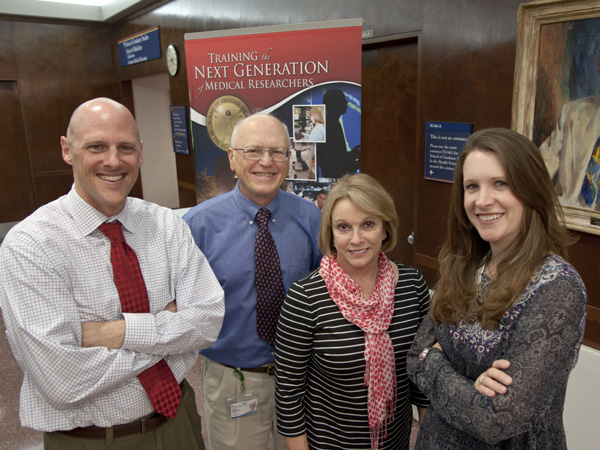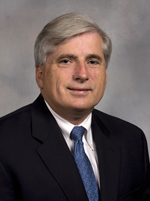Graduate School leaders look to future

Published in News Stories on December 18, 2014
The new year will bring restructuring of some administrative duties under the leadership of School of Graduate Studies in the Health Sciences Dean Dr. Joey Granger.
Dr. Libby Spence, professor of medical laboratory sciences and associate dean of academic affairs, will enter the retirement ranks at the end of the month. She joins Dr. Greg Chinchar, professor of microbiology and associate dean of student affairs, who retired in June but has since returned part-time with the Graduate School.
Taking on Spence’s duties as assistant dean of academic affairs is Dr. Sydney Murphy, assistant professor of pharmacology and toxicology. Dr. Mike Ryan, associate professor of physiology and biophysics, assumed Chinchar’s position following his summer retirement.
Granger, who spends about 25 percent of his time on Graduate School duties and his remaining time on research and teaching, began building a much-needed leadership team after he became dean in 2007. “When I took over, I only had one administrative assistant, and no assistant deans,” he said. “We were tasked at the time with our graduate school going through its first accreditation ever. There was a lot to do.

Granger
“I was fortunate to have Libby join us from the School of Health-Related Professions, and she played an instrumental role in the school achieving accreditation,” Granger said. “Then I hired Greg. He and Libby didn’t even have titles to begin with.”
Between Chinchar and Spence, Granger said, the registration and advising processes were enhanced and a system was created to maintain Graduate School data electronically. Spence collected all data needed to keep abreast of accreditation requirements, including data on new course offerings and students’ grades, he said.
In addition to his teaching and research duties in the School of Medicine, Chinchar “became my quality control man,” Granger said. “His biggest role was leading a five-year external review of our programs. People outside the Graduate School assist in reviewing us, and that takes a lot of time and effort.”
Although 100 percent of Spence’s time was devoted to the Graduate School, Granger said, Murphy will continue an active role in the School of Medicine, where she will teach pharmacology and continue her pre-eclampsia research program.
Murphy also will take over accreditation duties. “When we replaced Libby, we looked for someone who would be here for that,” Granger said. “We’re always preparing for accreditation, and our next SACS (Southern Association of Colleges and Schools) accreditation is six years from now. I wanted someone to collect the data and to be proactive there.”
Spence, who came to UMMC in 1988 as a SHRP instructor in clinical laboratory sciences, received her Ph.D. in educational leadership from Ole Miss. Her previous experience in compliance and laboratory expertise “seemed like a perfect marriage with the Graduate School,” Spence said of joining Granger’s staff after 19 years with SHRP.
Her main responsibilities have included oversight of SACS accreditation, academic administration and teaching, most recently a class called Teaching in Higher Education. Spence hopes in the future to return to the Graduate School to teach and direct its Teachers in Training Program for post-doctoral fellows and graduate students.
“What most attracted me to this job is getting to build and design a system for accreditation that ensures we are compliant with all SACS standards,” Spence said. “That involves things like instituting an annual report for each academic program, maintaining academic and alumni data, as well as providing statistics that drive changes in the Graduate School.”
Ryan also will maintain a significant research and teaching role in the School of Medicine, and will spend about 25 percent of his time on Graduate School duties. His main focus in the Graduate School will continue to be student recruitment and leading the Discovery U programs. Discovery U exposes K-12 and undergraduate students to biomedical research in UMMC laboratories during year-round programs that also serve as recruitment tools.
“When I came on in July, Dr. Granger originally brought me in as associate dean for recruitment and outreach,” said Ryan, who came to UMMC in 2004. “In the shuffle, we realized that to be consistent with other graduate schools nationally, we needed a dean of student affairs. My interaction with students makes me a natural fit for that role.”
Murphy and Granger say that because Murphy received her Ph.D. at UMMC, it gives her a unique perspective in reaching out to students.
“I’ve always been interested in helping students,” said Murphy, who received her Ph.D. in physiology in 2010. “I’ve seen the graduate school grow since Dr. Granger became dean, and we want to keep that momentum going and make the student experience even better. We have a great graduate program at UMMC, not just a great medical school, and we want to make our students feel loved and wanted.”
Chinchar was the driving force behind creation of the Graduate School’s master of biomedical science program.
“In the past, what I mostly did was research,” Chinchar said. “But, I like the interaction with students and the variety of activities here. The master’s program meets the needs of the students at this institution by preparing them for the challenge of professional school and helps the admissions committee select good candidates for medical or dental school.”
The changes come at a pivotal time for the Graduate School, Granger said.
“We have some new programs we’re considering in line with our research programs, and that’s to build clinical research infrastructure,” he said. “We are developing a master of science in clinical investigation. It’s sometimes difficult to recruit scientists, so we want to grow our own.”


